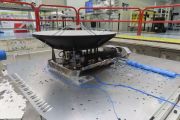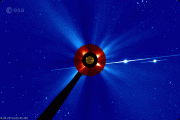
Copernical Team
Sidus Space and VORAGO to Develop Advanced Radiation-Hardened Microcontrollers for Space and Defense
 Sidus Space (NASDAQ: SIDU) has entered a strategic collaboration with VORAGO Technologies to co-develop and integrate next-generation radiation-hardened microcontroller (MCU) systems as part of VORAGO's Alpha Customer Program. The initiative is aimed at advancing Sidus' multi-domain space and defense infrastructure.
This partnership enables Sidus to test and implement VORAGO's high-perform
Sidus Space (NASDAQ: SIDU) has entered a strategic collaboration with VORAGO Technologies to co-develop and integrate next-generation radiation-hardened microcontroller (MCU) systems as part of VORAGO's Alpha Customer Program. The initiative is aimed at advancing Sidus' multi-domain space and defense infrastructure.
This partnership enables Sidus to test and implement VORAGO's high-perform Planet expands defense partnerships with key AI surveillance contracts
 Planet Labs PBC (NYSE: PL) has secured four significant contracts in the Defense and Intelligence sector, following its June 2025 earnings report. The new deals underscore rising demand for the company's AI-enhanced satellite data offerings that support critical government operations worldwide.
Among the latest wins, Planet signed a euro 240 million contract underwritten by Germany, which
Planet Labs PBC (NYSE: PL) has secured four significant contracts in the Defense and Intelligence sector, following its June 2025 earnings report. The new deals underscore rising demand for the company's AI-enhanced satellite data offerings that support critical government operations worldwide.
Among the latest wins, Planet signed a euro 240 million contract underwritten by Germany, which NASA spacecraft captures detailed images of Donaldjohanson asteroid
 Scientists from NASA's Lucy mission have completed initial analysis of data gathered during the spacecraft's April 20 flyby of the main-belt asteroid Donaldjohanson. Images taken by Lucy's L'LORRI imager just minutes before closest approach have provided a comprehensive view of the asteroid, marking a successful test for future operations.
Mission engineers describe the event as a crucial
Scientists from NASA's Lucy mission have completed initial analysis of data gathered during the spacecraft's April 20 flyby of the main-belt asteroid Donaldjohanson. Images taken by Lucy's L'LORRI imager just minutes before closest approach have provided a comprehensive view of the asteroid, marking a successful test for future operations.
Mission engineers describe the event as a crucial NASA shares SPHEREx sky survey data weekly to enable global cosmic research
 NASA's SPHEREx space telescope, launched in March, has begun publicly releasing data from its infrared sky survey, offering scientists worldwide weekly access to its extensive cosmic observations. The mission is designed to map the entire sky twice a year over a two-year period, capturing images in 102 infrared wavelengths to support investigations ranging from the origins of the universe to the
NASA's SPHEREx space telescope, launched in March, has begun publicly releasing data from its infrared sky survey, offering scientists worldwide weekly access to its extensive cosmic observations. The mission is designed to map the entire sky twice a year over a two-year period, capturing images in 102 infrared wavelengths to support investigations ranging from the origins of the universe to the Mars lost habitability due to its own climate self-limiting cycle
 Mars may once have flowed with rivers and lakes, but a new study led by University of Chicago planetary scientist Edwin Kite suggests its warm periods were fleeting and ultimately doomed by a self-regulating climate system. Published July 2 in Nature, the research presents a model in which increasing solar brightness briefly allowed water to flow before triggering a geochemical response that loc
Mars may once have flowed with rivers and lakes, but a new study led by University of Chicago planetary scientist Edwin Kite suggests its warm periods were fleeting and ultimately doomed by a self-regulating climate system. Published July 2 in Nature, the research presents a model in which increasing solar brightness briefly allowed water to flow before triggering a geochemical response that loc Heat sink technology put to the test aboard Australian satellite mission
 A research team led by mechanical science and engineering professor Mickey Clemon at the University of Illinois Urbana-Champaign is testing advanced cooling systems in space to improve heat sink performance for satellite electronics.
Space presents a unique challenge for electronics: high waste heat output with no atmosphere for convective cooling. To counteract this, the team embedded a w
A research team led by mechanical science and engineering professor Mickey Clemon at the University of Illinois Urbana-Champaign is testing advanced cooling systems in space to improve heat sink performance for satellite electronics.
Space presents a unique challenge for electronics: high waste heat output with no atmosphere for convective cooling. To counteract this, the team embedded a w Europe launches first geostationary atmospheric sounder to boost extreme weather forecasts
 Europe has advanced its ability to track extreme weather with the launch of the Meteosat Third Generation Sounder 1 (MTG-S1), the continent's first geostationary meteorological sounder. The satellite will deliver critical atmospheric data that supports earlier and more accurate weather alerts, helping to safeguard people, infrastructure, and economies.
MTG-S1 lifted off on 1 July 2025 and
Europe has advanced its ability to track extreme weather with the launch of the Meteosat Third Generation Sounder 1 (MTG-S1), the continent's first geostationary meteorological sounder. The satellite will deliver critical atmospheric data that supports earlier and more accurate weather alerts, helping to safeguard people, infrastructure, and economies.
MTG-S1 lifted off on 1 July 2025 and Competing wave patterns may unlock turbulent secrets in hypersonic vehicle design
 Recent progress in hypersonic aerodynamics has shed light on one of the field's longest-standing puzzles: the unpredictable transition from smooth to turbulent airflow around blunt-nosed vehicles. This transition dramatically increases drag and thermal load, posing a major challenge to hypersonic flight systems.
Traditionally, researchers attributed this boundary layer transition to modal
Recent progress in hypersonic aerodynamics has shed light on one of the field's longest-standing puzzles: the unpredictable transition from smooth to turbulent airflow around blunt-nosed vehicles. This transition dramatically increases drag and thermal load, posing a major challenge to hypersonic flight systems.
Traditionally, researchers attributed this boundary layer transition to modal China launches international association to boost global access to deep space research
 China will inaugurate the International Deep Space Exploration Association (IDSEA) next Monday, marking its first international academic body dedicated to aerospace. Based in Hefei, Anhui province, the association is designed to foster global collaboration, with an emphasis on empowering developing countries to access and advance deep-space technologies.
The IDSEA, co-founded by the Hefei-
China will inaugurate the International Deep Space Exploration Association (IDSEA) next Monday, marking its first international academic body dedicated to aerospace. Based in Hefei, Anhui province, the association is designed to foster global collaboration, with an emphasis on empowering developing countries to access and advance deep-space technologies.
The IDSEA, co-founded by the Hefei- Boeing expands SES O3b mPOWER fleet with latest satellite delivery
 Boeing has delivered the ninth and tenth O3b mPOWER satellites to SES, bolstering the satellite operator's growing medium Earth orbit (MEO) constellation. The two newly completed spacecraft are equipped with Boeing's fully software-defined payloads, enabling dynamic power allocation to meet real-time user demands. Both satellites are en route to Kennedy Space Center in Florida for a scheduled su
Boeing has delivered the ninth and tenth O3b mPOWER satellites to SES, bolstering the satellite operator's growing medium Earth orbit (MEO) constellation. The two newly completed spacecraft are equipped with Boeing's fully software-defined payloads, enabling dynamic power allocation to meet real-time user demands. Both satellites are en route to Kennedy Space Center in Florida for a scheduled su 



































